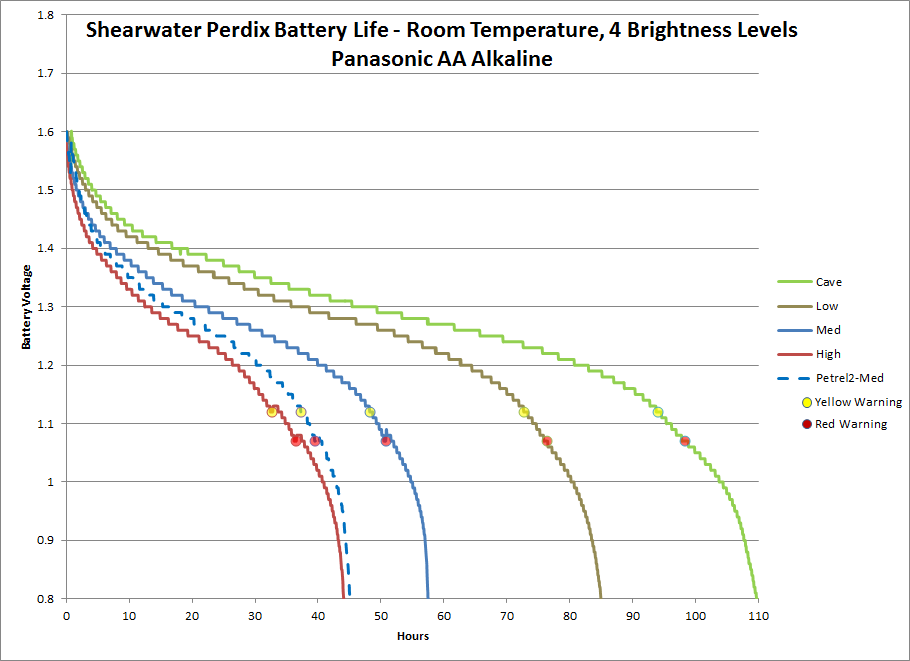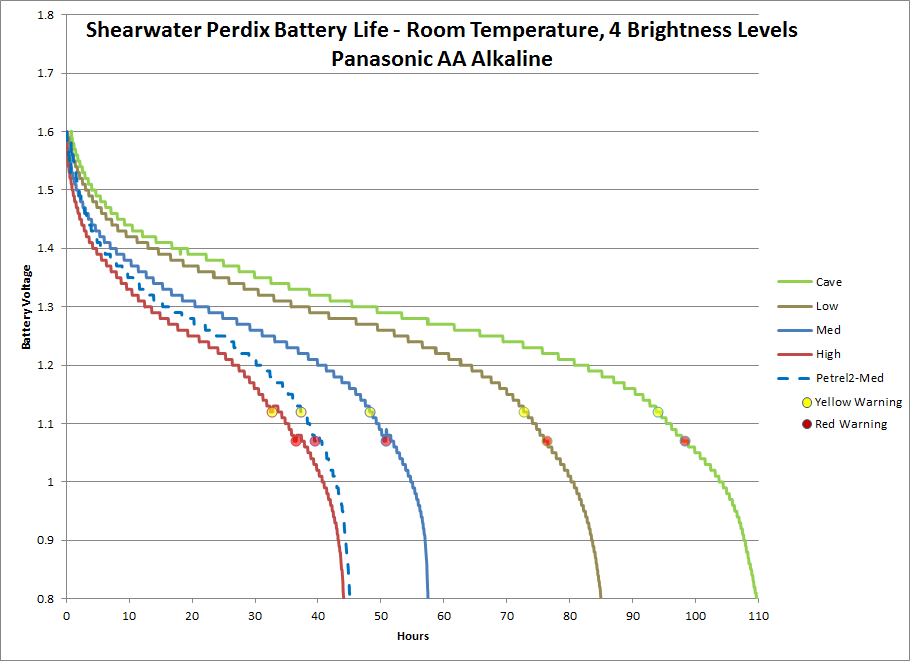The factors that affect battery life on the Shearwater Perdix and Petrel dive computers are, in order of most to least significant:
- Battery Type
- Display Brightness
- Model
- Temperature
Battery Type
The most significant factor affecting run time is battery type. Lithium batteries tend to have the highest capacities. Further, primary (non-rechargeable) batteries tend to offer longer run times than secondary (rechargeable) batteries.
For most users, the standard AA alkaline batteries offer a good balance of performance and cost. The major disadvantage of alkaline batteries is that can they leak corrosive fluids, especially when fully discharged. Do not store your computer with alkaline batteries installed for more than 1 or 2 months.
Battery life in Table 1 is for medium brightness at room temperature.
| Battery Type | Perdix | Petrel 2 | Cost (USD) |
|---|---|---|---|
|
Saft LS14500
3.6V Lithium |
130 hours | 100 hours | $7.00 |
|
Energizer Ultimate Lithium
1.5V Lithium |
70 hours | 50 hours | $3.00 |
| 1.5V Alkaline (e.g. Duracell Coppertop) | 50 hours | 35 hours | $0.75 |
|
Li-Ion 14500
Rechargeable 3.7V |
50 hours | 35 hours | $35.00
(2 batteries + charger) |
| NiMH Rechargeable 1.2V | 40 hours | 30 hours | $20.00
(2 batteries + charger) |
|
Carbon Zinc 1.5V
(not recommended) |
20 hours | 15 hours | $0.50 |
Table 1: Runtime for Various Battery Types
Ensure your battery type setting is correct when you change batteries. A common mistake is to use the 1.5V Alkaline setting with 1.5V Photo Lithium (Energizer Ultimate Lithium) batteries, or vice-versa. If the setting is wrong, warning levels will occur at the wrong times, leading to shorter than expected life or batteries dying without warning.
Display Brightness
The display is the major consumer of power in the Perdix and Petrel. The total Perdix system power consumption for various brightness settings is shown in Table 2.
| Brightness Setting | Power Consumption | Current at 3.3V |
|---|---|---|
| Turned off | 0.07 mW | 0.02 mA |
| Cave | 30 mW | 9 mA |
| Low | 40 mW | 12mA |
| Med | 53 mW | 16mA |
| High | 66 mW | 20 mA |
Table 2: Perdix Power Consumption at Various Brightness Settings
The “Auto” brightness setting uses measured ambient light conditions to optimize battery life and readability. In bright sunny conditions, the screen brightness is increased to compete with the sunlight glare. In dark conditions the brightness is reduced to maximize battery life.
Longest battery life is about 250 hours using a Saft LS14500 at cave brightness. Cave brightness is a new feature introduced in firmware version 33, created specifically for cave divers with a further reduced brightness.
Measured alkaline battery voltage when discharged in a Perdix is shown in Figure 1.

Figure 1: Alkaline Battery Discharge in Perdix at Various Brightness Levels
Model
The model of dive computer impacts battery life. The Perdix, being a newer model, is about 30% more efficient than the Petrel 2. Table 1 above shows a comparison at medium brightness. The Predator has similar battery life to the Petrel 2, but note that the Predator can only use the Saft LS14500 type battery.
Temperature
In general, batteries perform better in warm conditions than in cold conditions.
For example, alkaline batteries have about 75% of their capacity at 0°C as compared to at room temperature (22°C). This drops to about 25% at -20°C. NiMH performance is similar to alkaline.
Cold water divers should choose a lithium battery such as the Energizer Ultimate Lithium or Saft LS14500, as these have the best cold weather performance. Lithium batteries retain 95% of their capacity at 0°C and 75% at -20°C.





